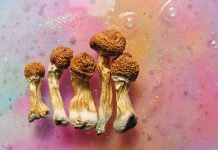Just two doses of psilocybin, a compound found in magic mushrooms, combined with psychotherapy, can help those suffering from alcohol addiction
A study led by researchers at NYU Grossman School of Medicine has revealed that a prescription of psilocybin, in combination with psychotherapy, can reduce heavy drinking by 83% amongst those with alcohol addiction.
Researchers investigated 93 men and women with alcohol dependence. Each participant was randomly assigned either:
- Two doses of psilocybin
- Antihistamine placebo
Neither researchers nor participants knew which medication they received.
Eight months after treatment began – which included psychotherapy – results were reviewed.
PSILOCYBIN USERS HAD REDUCED THEIR HEAVY DRINKING BY 83%
Psilocybin users had reduced their heavy drinking by 83% relative to their drinking before the study began whereas those who had received antihistamine reduced their drinking by 51%.
Another key finding came up: eight months after their first dose, almost half (48%) of individuals who received psilocybin stopped drinking altogether compared with 24% of the placebo group.
Alcohol use disorder is notoriously hard to treat
“Our findings strongly suggest that psilocybin therapy is a promising means of treating alcohol use disorder, a complex disease that has proven notoriously difficult to manage,” explains senior study author and psychiatrist Michael Bogenschutz, MD, director of the NYU Langone Center for Psychedelic Medicine.
“As research into psychedelic treatment grows, we find more possible applications for mental health conditions,” adds Bogenschutz.
“Beyond alcohol use disorder, this approach may prove useful in treating other addictions such as cigarette smoking and abuse of cocaine and opioids.”
However, Bogenschutz mentions that the research team next plans to conduct a larger, multicenter trial to really understand how psilocybin can help those with alcohol addiction.
More work needs to be done, he explains. There needs to be clarification on appropriate dosing before the drug is ready for widespread clinical use, Bogenschutz concludes.
Editor's Recommended Articles
-
Must Read >> Late-onset alcohol abuse can be symptom of dementia


















